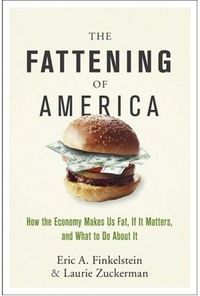

Purchase
How The Economy Makes Us Fat, If It Matters, and What To Do About It
Wiley
January 2008
On Sale: January 9, 2008
274 pages
ISBN: 0470124660
EAN: 9780470124666
Hardcover
Add to Wish List
Non-Fiction
Over two-thirds of Americans are overweight or obese. What's
alarming about this statistic is not just the volume of
Americans who have tipped their scales—but the velocity at
which they're doing it. Over the past three decades, the
number of obese Americans has more than doubled. The
increase occurred up and down the socioeconomic spectrum,
for all racial and ethnic groups, and, most dramatically,
for America's children. What's behind the sudden, explosive rise in obesity rates?
In a word, it's economics. Author Eric Finkelstein, a
renowned health economist who has spent much of his career
studying the economics of obesity, with the help of coauthor
Laurie Zuckerman, reveals why America's growing waistline is
a by-product of our economic and technological success.
Because of declining food costs, especially for
high-calorie, low-nutrient foods, and increasing usage of
technology, which make Americans more sedentary, the
environment has changed in such a way that we're eating more
calories and burning off less. The issue is not that Americans don't care about their
increasing waistlines—quite the opposite, in fact. But the
reality is that in America's (and increasingly the world's)
obesity-inducing environment, the sustained changes in
behavior required to lose the weight and keep it off are
simply too difficult—and becoming more difficult all the
time. Moreover, generous insurance coverage and vastly
improved medical treatments have lowered the health costs,
if not the monetary costs, of excess weight. So carrying a
few extra pounds is not as bad for one's health as it used
to be. Finkelstein and Zuckerman blend theory, research, and
engaging—sometimes hilarious—personal anecdotes to break
down the causes and the consequences of America's obesity
epidemic. One by one, they explore the media's claim that
obesity is making our businesses less competitive, pushing
good jobs overseas, hurting our military readiness,
increasing our taxes, and helping to bankrupt the Medicare
and Medicaid programs. Along the way, the authors also
reveal how the obesity epidemic has spurred tremendous
demand for all sorts of new products and services, creating
a flourishing new market that they call "The ObesEconomy." The Fattening of America outlines the issues we must deal
with to confront obesity. The authors explore the role that
business and policymakers play in America's obesity
epidemic, and explain that successful obesity prevention
strategies need to do exactly the opposite of where the
economy is taking us. They need to make it cheaper and
easier to be thin—not fat. However, because obesity is a
natural by-product of an expanding economy, the authors
question whether or not obesity prevention efforts, even if
successful, would actually leave some individuals worse off.
Comments
No comments posted.
Registered users may leave comments.
Log in or register now!
| 


 © 2003-2025 off-the-edge.net
all rights reserved Privacy Policy
© 2003-2025 off-the-edge.net
all rights reserved Privacy Policy